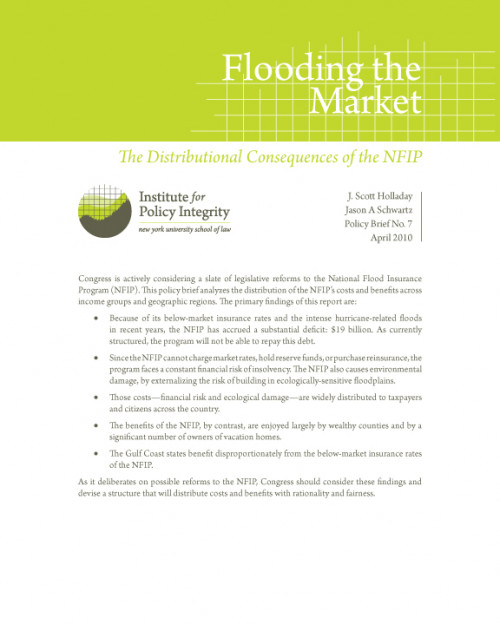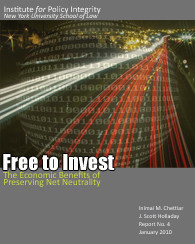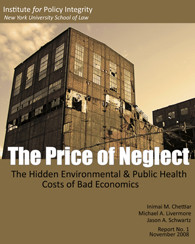-
Public comments in support of safe prisons
Today is the deadline for public comments on a Department of Justice regulation that would protect individuals in prison from sexual assault.
-
Comments on FCC Future of Media Project
Today marks the deadline for comments on the Federal Communication Commission’s Examination of the Future of Media and Information Needs of Communities in a Digital Age, a task force dedicated to solving the crisis in the media. The shift to online news consumption has led to falling revenue, major lay-offs, cuts in coverage, and serious questions about the future of journalism.
-

Flooding the Market
The Distributional Consequences of the NFIP
The government’s flood insurance program gives discounts to homeowners who build in flood-prone areas, often causing significant environmental damage. In this analysis, the Institute for Policy Integrity finds that this practice can benefit wealthy owners of expensive homes at a cost to the average taxpayer.
-
Comments in support of net neutrality rule
Policy Integrity submitted comments to the Federal Communications Commission (FCC) in support of a proposed rule that would prevent Internet-service providers from price discrimination. The comments argue that the presence of positive externalities, including the public good nature of information and network externalities, justify the regulation.
-

Free To Invest
The Economic Benefits of Preserving Net Neutrality
It is hard to imagine a future where the value of the Web takes a downward spiral: where less content is created, online access is less useful, and fewer people log on. In Free to Invest, the Institute for Policy Integrity warns of negative economic consequences if net neutrality is weakened. The report arrived at five main findings that describe the trade-offs of revoking net neutrality.
-
Amicus brief against hazardous trucking regulations
In November 2008, the Bush Administration finalized a regulation allowing truck drivers to spend more hours behind the wheel. To counter the deregulation, advocacy groups including Public Citizen filed suit against the Federal Motor Carrier and Safety Administration (part of the Department of Transportation) in March 2009.
-
Motion for leave against hazardous truck driver rules
In November 2008, just weeks before President Obama took office, the Bush Administration finalized a rule increasing the amount of time truck drivers can spend behind the wheel—creating a possible public health and safety hazard. The rule allows truck drivers to drive for 11 hours, one more hour than they were allowed before 2003, and allows them to drive as many as 77 hours in seven days or 88 hours in eight days, over 25 percent more than previously allowed by federal law.
-
Comments in support of the rescission of the Physician Conscience rule
With litigation pending by ACLU, Planned Parenthood, the State of Connecticut and six other states against the physician conscience rule, the new Obama Administration proposed a rescission of the rule. Policy Integrity joined the coalition to submit comments in support of that action.
-

The Price of Neglect
The Hidden Environmental and Public Health Costs of Bad Economics
This report examines the regulatory failures of the Bush years on issues as wide-ranging as climate change and workplace safety, and concludes that these failures did not arise because of an overuse of economics, but because economic and scientific evidence was ignored.
-
Letter to the OMB re: refusal of health care services on moral grounds
In August 2008, the Department of Health and Human Services (HHS) proposed a regulation that would expand protections for medical professionals who refuse to provide health care services that they object to on moral grounds. Policy Integrity worked with a coalition of women’s health organizations to oppose the rule based on its finding that HHS ignored the negative consequences this policy could have on access to care, especially for women seeking reproductive health services.
Viewing recent projects in Consumer and Healthcare Protection
